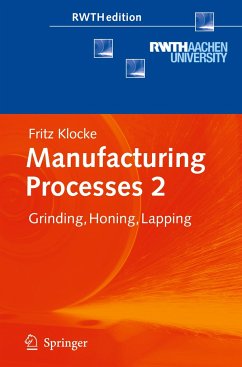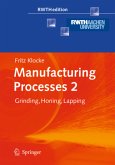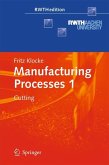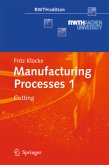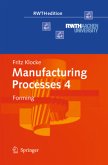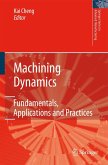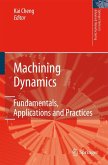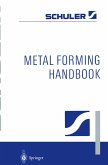The book series on manufacturing processes for engineers by Klocke is a reference for scientific and industrial experts. The compendium presents an overall picture of the most common machining and non-machining manufacturing processes.
This volume on Grinding, Honing and Lapping starts from the basics of cutting edge engagement during grinding including chip formation, forces involved and energy distribution, as well as the wear of grinding grits. The characteristics of abrasive tools, their design and manufacturing are described, followed by the fundamentals of grinding fluids. Grinding of different materials (steel, cast iron, hard and brittle materials, nickel and titanium) is treated in-depth. Different grinding processes and their kinematic characteristics are then presented in detail. The parameters of different grinding procedures, references to process implementations as well as typical industrial applications are likewise specified. Besides honing and lapping, practical insights into polishing are provided. Special abrasive processes are presented including ultrasound assisted grinding and cutting with geometrically undefined cutting edges. Finally, monitoring systems for process control are discussed considering their increasing relevance and application in industrial manufacturing.
The book is a comprehensive treatment of abrasive processes. It appears in the RWTH Edition Series as part of a 4 volume reference work.
The future of manufacturing companies depends largely on their ability to adapt to swiftly changing global conditions. These are exemplified by international com- tition, rapidly growing intercommunication and the increased significance of en- ronmental issues [KLOC98a, ENGE02]. Precision machining with geometrically undefined cutting edges represents a key production engineering technology with high efficiency, security and machining quality. DIN norm 8589 subsumes within the group "machining with geometrically - defined cutting edges" the following material removal manufacturing processes: grinding, honing, lapping, free abrasive grinding and abrasive blast cutting. - chining is carried out in these production methods by means of more or less - regularly formed grains composed of hard substances brought into contact with the material. Of all methods understood as machining with geometrically undefined cutting edges, only grinding, honing and lapping can, strictly speaking, be considered p- cision machining. Free abrasive grinding and abrasive blast cutting, also treated in this book, represent a special group, as they generally cannot bring about geom- rical change in the material.
This volume on Grinding, Honing and Lapping starts from the basics of cutting edge engagement during grinding including chip formation, forces involved and energy distribution, as well as the wear of grinding grits. The characteristics of abrasive tools, their design and manufacturing are described, followed by the fundamentals of grinding fluids. Grinding of different materials (steel, cast iron, hard and brittle materials, nickel and titanium) is treated in-depth. Different grinding processes and their kinematic characteristics are then presented in detail. The parameters of different grinding procedures, references to process implementations as well as typical industrial applications are likewise specified. Besides honing and lapping, practical insights into polishing are provided. Special abrasive processes are presented including ultrasound assisted grinding and cutting with geometrically undefined cutting edges. Finally, monitoring systems for process control are discussed considering their increasing relevance and application in industrial manufacturing.
The book is a comprehensive treatment of abrasive processes. It appears in the RWTH Edition Series as part of a 4 volume reference work.
The future of manufacturing companies depends largely on their ability to adapt to swiftly changing global conditions. These are exemplified by international com- tition, rapidly growing intercommunication and the increased significance of en- ronmental issues [KLOC98a, ENGE02]. Precision machining with geometrically undefined cutting edges represents a key production engineering technology with high efficiency, security and machining quality. DIN norm 8589 subsumes within the group "machining with geometrically - defined cutting edges" the following material removal manufacturing processes: grinding, honing, lapping, free abrasive grinding and abrasive blast cutting. - chining is carried out in these production methods by means of more or less - regularly formed grains composed of hard substances brought into contact with the material. Of all methods understood as machining with geometrically undefined cutting edges, only grinding, honing and lapping can, strictly speaking, be considered p- cision machining. Free abrasive grinding and abrasive blast cutting, also treated in this book, represent a special group, as they generally cannot bring about geom- rical change in the material.

